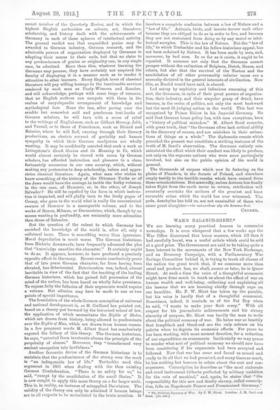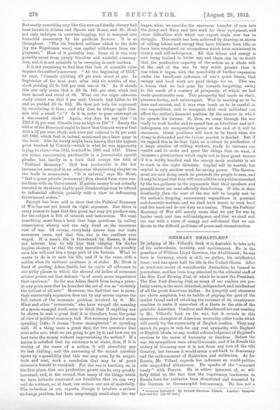WAR'S BALANCE-SHEET.* WE are learning many practical lessons in economics
nowadays. It is even whispered that a few weeks ago the War Office discovered that horse manure, which till then it had carefully burnt, was a useful article which could be sold at a good price. The Government are said to he taking quite a keen interest in the movements of the New York Exchange, and an Economy Campaign, with a Parliamentary War Savings Committee behind it, is trying to teach all classes of the nation the great truth that, if we consume more than usual and produce less, we shall, sooner or later, be in Queer Street. At Boole a time the voice of a thoughtful economist might have done much to teach us about the effect of war on human wealth and well-being, collecting and explaining all the lessons that we are learning chiefly through raps on our knuckles. Mr. F. W. Hirst has taken up the parable, but his voice is hardly that of a thoughtful economist. Sometimes, indeed, it reminds us of the Fat Boy when he said, "I wants to make your flesh creep." With all respect for hie journalistic achievements and his strong sincerity of purpose, Mr. Hirst was hardly the man to write about the political economy of war. He hates war so heartily that lampblack and blood-red arc the only colours on his palette when he depicts its economic effects. For years he has been working, with most earnest devotion, for a reduction of our expenditure on armaments. Incidentally we may pause to wonder what sort of political economy we should now have been considering if his arguments had been accepted and followed. Now that war has come and found us armed and ready to do all that we had promised, and many times as much, he has nothing but horrors to relate about the cost and con- sequences. Conscription he describes as "the most elaborate and cruel instrument hitherto perfected by military ambition for the ruin of mankind," and, again, he states that "the responsibility for this new and deadly slavery, called conscrip- tion, falls on Napoleonic France and Prassianized Germany."
The Political Boo-mail 0, War. 13: I', W. Banat. London 7. M. Dont and Sons. Os, uot:.1 But surely something very like this new and deadly slavery had been known in Athens and Sparta and Rome, and Mr. Hirst not only indulges in question-begging, but is tempted into historical inaccuracy by his pacificist fervour. It is so throughout. "The six hundred millions added to the debt [by the Napoleonic wars] was capital withdrawn from em- ployment." Most of it probably was. Some of it was very possibly saved from purely frivolous and wasteful consump- tion, and it is not scientific to be sweeping in such matters.
It is not surprising to find that this lack of scientific calm impairs the author's accuracy. "At; the beginning of 1853," he says, "Consols yielding £3 per cent. stood at par. In September of the next year, after only six months of war, stock yielding 23 3s. 10d, per cent, was at 94." As it stands this can only mean that a £3 3s. 10d. per cent. stock had been issued and stood at 94. What our too eager advocate really meant was that 3 per cent. Consols had fallen to 94 and so yielded £3 3s. 10d. He does not help his argument by overstating it thus ; and why does he always spell Con- sols with a small " o " P Is it in order to pour contempt on a war-created stock P Again, why does he say that a in 1897-8 24 per cent. Consols rose as high as 110 "P Surely the editor of the Economist ought to know that Consols were at that date a 2f per cent, stook, and were not reduced to 21- per cent. till 1903, which fact is, indeed; mentioned on a later page in the book. Also he surely might have known that the highest price touched by Consols—which is what he was apparently trying to state—was 113f, touched in 1896 and 1897. These are minor inaccuracies, pardonable in a journalistic special pleaaer, but hardly in a book that usurps the title of "Political Economy." Still less pardonable is the low insinuation conveyed in an otherwise illuminating chapter on the trade in armaments. "It is natural," says Mr. Hirst, "that a great private [armament] firm should form close con- nections with its Government. If public money is not actually invested in its shares, highly-paid directorships may be offered to influential officials, possibly with a view to influencing Government orders."
Enough has been said to show that the Political Economy of War has not yet found its right exponent. But there is every reason to hope that this great war may yet produce one, for the subject is full of interest and instruction. We want something more than a book that begs questions by calling conscription slavery and can only dwell on the enormous coat of war. Of course, everybody knows that war costs enormous sums, and that this war is the costliest ever waged. If a man's life is threatened by disease, it does not interest him to tell him that obeying his doctor implies slavery, or that the only operation that can possibly save him will cost him a large part of his fortune. What he wants to do is to save his life, and it is the same with a nation when its national existence is at stake. Mr. Hirst is fond of quoting Adam Smith, but be omits all reference to one pithy phrase in which the shrewd old father of economic science points out that defence "is of much more importance than opulence." So far was Adam Smith from being a peace- at-any-price man that be describes the art of war as "certainly the noblest of all arts." Moreover, the fact that war is nowa- days enormously expensive does not by any means express the full extent of the economic problem involved by it. Mr. Hirst and other "economists," who have warped the meaning of a much-wronged word, seem to think that if anything can be shown to cost a great deal it is therefore, from the point of view of political economy, bad. But economy does not mean spending little; it means "house management" or spending well. If a thing costs a great deal, the two questions that next arise are; what we are going to got by it, and how can we best raise the money without impoverishing the nation P If a nation is satisfied that its existence is at stake, then, if it is worthy of the name of a nation, it will cheerfully pay its last shilling ; and the answering of the second question opens up a possibility that this war may even, by its magni- tude and cost, work a revolution that may be of great economic benefit to mankind. For the war is teaching us, in the first place, that our productive power can be very greatly increased, and, in the second, that many of the things which we have hitherto consumed are frivolities that we can very well do without, or, at least, can reduce our use of materially, The reduction in our exports, though it involves a serious exchange problem, has been surprisingly small since the war began, when we consider the enormous transfer of men into the Army and Navy and into work for their equipment, and other difficulties with which our export trade now has to struggle. This result has been achieved by drawing on stores of willing labour and energy that have hitherto been idle, or have been employed on occupations which have ministered to luxury and self-indulgence. All this labour and energy is now being trained to better use, and there can be no doubt that the productive capacity of the nation as a whole will at the end of the war be very much greater than it was when it began, with the possibility of further expansion under the beneficent influence of war's great lesson, that energy and hard work are good things for us. This was a lesson that we had gone far towards forgetting, owing to the result of a century of prosperity, of which we had made questionable uses. This prosperity had made us slack, pleasure-loving, and extravagant. War is teaching us to be keen and earnest, and it may even teach us to be careful in our expenditure, and to recognize that each individual can affect the nation's financial position by the manner in which he spends his income. If, then, we come through the war ready to work harder and to spend less on frivolities and self- indulgence, our recuperative power at the end of it will be enormous. Great problems will have to be faced when the Army is disbanded and the labour market is flooded. But if we regard this in its true light, as a return to production of a large number of willing workers, ready to increase our wealth and to make and grow the things that we want, it becomes a phenomenon which ought not to have great terrors if it is boldly handled and the energy made available is set to work in the right direction. Capital will be wanted, but capital is only another word for saving power. The Govern- ment are now doing much to persuade the people to save, and it may be hoped that they will soon add the compulsion exercised by the tax-gatherer to the arguments that their speakers and pamphleteers are semi-officially distributing. If this is done drastically, then the cost of the war will be largely met by the nation's forgoing unnecessary expenditure in personal and domestic matters, and we shall have learnt to work bard and live hard and do our duty as a nation. Then the Political Economy of War will merely mean that we pay for war by harder work and less self-indulgence, and that we shall end the war with a store of energy and self-denial that we can devote to the difficult problems of peace and reconstruction.



































 Previous page
Previous page